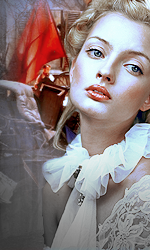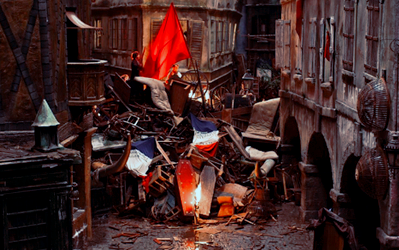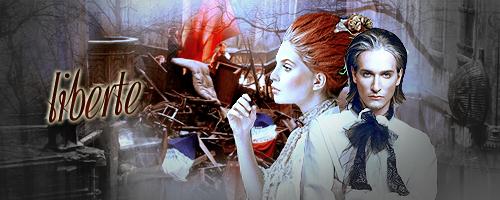Post by HENRI ROQUEFEUIL-BLANQUEFORT on Feb 16, 2013 13:46:39 GMT -5
| [atrb=border,0,true][atrb=style, background-color: f9f9f9; border: #1f4579 solid 10px; width: 420px; padding: 15 5 15 5px;] |
At the end of the day you're another day colder

FULL NAME: Vicomte Henri Roquefeuil-Blanquefort
NICKNAMES: Henri... not that it's really a nickname.
HERITAGE: French
AGE: Twenty-five
GROUP: Sacred Heart
PLAYBY: Hans Matheson
-----
PERSONALITY:
An idealist by nature, Henri has developed from a gentle but somewhat rebellious boy into a man who can never admit how much he's been worn out by the escalating violence. He cares deeply about the fate and happiness of the people around him, but has been radicalized with the passing years into something quite unlike the boy who would slip away into the woods. Religion, once an aspect of his life no more important than any other, has been deformed into a justification for violence that doesn't always hold to the gentler side of Catholic morality.
That said, he does generally keep to a somewhat militarized vision of his religion's teachings with only rare lapses of anything but a militant nature. His sense of honor and right and wrong is strong, but perhaps increasingly skewed as he spends longer and longer in the forest.
Henri has a deep love of freedom, and developed an affinity for riding and hunting (though he rarely actually shot any game) from a young age. He's a good shot (as good as one can be with the firearms of the time), and a fairly experienced fencer.
Despite the time spent in the forest and a certain fondness for the simplicity of peasant food, Henri does retain a preference for better varieties of wine and cuts of meat. This, however, he typically allows to remain unvoiced to avoid looking so much like the aristocrat his birth and title make him.
He dislikes long periods of inaction, and has little patience for those he considers enemies to the cause unless some personal connection prevents him from brutality. With friends he, at his best, gentle and polite--but with the events wearing on him, he's become increasingly distant from them and sometimes short with them.
In former days, he could effectively split himself between a proper young aristocrat and a fearless rebel, but the two have begun to become convoluted with the latter taking primacy. Still, with effort and patience he could be cleaned up back into a passable--if iconoclastic--vicomte.
APPEARANCE:
A fairly athletic man of average height, Henri's physical condition is good as the result of so much time spent active in the forest. He usually dresses for practicality, though he does maintain a few better outfits that better reflect his formal rank for when the occasion requires it. He's generally fairly clean-shaven, though living in the forest precludes that from time to time.
He has a few scars from both the normal daily accidents of an active life, and another—generally concealed by his clothing on the right side of his ribcage—that indicates a graze wound from a bullet, acquired during one of the Sacred Heart's first skirmishes. Other than this, none are particularly remarkable.
GOALS:
Henri's driving goal is to contribute to the building of a republic, though his aristocratic roots show at points in how he imagines it. He would like to someday marry Helene, but feels that the current situation is not one intended for conjugal bliss—and he wonders, privately, if she can still love the man he has become. He fears he has become a man like his father but simply with different ideals, and this frightens him.
HISTORY:
Henri had been an intelligent boy, if sometimes a rebellious one—but the spirit of rebellion within him was a love of freedom far more than a desire to cause trouble. It was this that led him to read philosophy and come to establish ideas of which he was never certain his father entirely approved. It was this, also, that drew him inexorably toward the forest. There in the forest he met Helene and learned the skills that might enable him to command an irregular army.
His father was a demanding man who held high expectations for his only surviving son. Another boy had been born five years before Henri, but he had died—under circumstances that Henri never learned the details regarding. After another series of miscarriages, finally Henri was born. Suddenly all of the elder Vicomte's aspirations rested on this boy who learned early to walk and talk, but also try slip away from his nurses.
It was these unchaperoned adventures beyond the estate's immediate garden that yielded him his first true friendship. Nathaniel Re Denei, a Parisian transplanted to the countryside and very close to him in age. As only sons they found one another ideal playmates and, with time, confidants as they grew up without a connection to blood siblings.
Henri was thirteen when he began to realize his father's iron-fisted dealings with the countryside. Never a man to be slighted, he operated as an arm of an increasingly despotic regime and, Henri was shocked to discover, was rewarded for it. He kept as quiet as he could for a time before spilling to Nathaniel over a bottle of stolen wine his concerns, fears, hopes and—most dangerous of all—ideas.
Life went on, though the two boys shared their hopes for a future that would replace Henri's lifestyle with something else entirely. He wondered sometimes if he would really be happy with that, but decided he must be—it was right, and that had to outrank his personal comfort. Always, or else he would never be any better than his father.
He was almost twenty when he met the fifteen year old Helene, deep in those forests that had become his preferred escape. She was beautiful, but he felt that she was perhaps too young to understand his feelings for her and he remained silent as to his developing love for her.
When Henri's father discovered this friendship in the woods, he assumed immediately that his son was not only associating with a higher sort of rabble, but that he was involving himself with the girl in an inappropriate manner. It had much to do with the reputation of Helene's mother—Henri's father believed that the daughter of a woman with a reputation based on promiscuity could be nothing less than a whore herself, despite her glorified upbringing.
The trouble was that the Vicomte could do little to prevent his son, legally a grown man, from spending his time in the woods. Even when Henri had been a boy it had been a losing battle, and now the issue was far worse—there was similarly little to prevent Henri from simply leaving the estate altogether and trying to re-establish his life in Paris or even abroad. The answer, then, was to prevent the girl from meeting him—and this he tried to do.
Their meetings, nevertheless, continued. With time Henri became aware that his feelings for Helene were shared, and their relationship developed into a romance.
When he decided it would be best to unseat his father and fight for a republican form of government, Nathaniel was at first hesitant, Henri believed. When one day at the age of twenty-two he broached the subject not as a hypothetical question, but as a request that he join him to command this movement... Nathaniel agreed. Henri was pleased, but internally surprised—though he felt blessed, just the same, to have someone so gifted with the practical matters of command that Henri, though not bad at, was not truly and genuinely gifted in.
A year later his father was dead after a bout with illness, and Henri himself was the Vicomte. The estate is his, but he's turned most of its finances to financing the rebellion. His mother remains there and he has promised to keep her safe to the best of his ability despite the gathering storm. He's become so caught up in the tide of revolution, however, that he scarcely thinks about the estate anymore.
-----
ALIAS: Ashley
AGE: 21
GENDER: Female
OTHER CHARACTERS: None yet.
HOW DID YOU FIND US: RPG-D.
ROLEPLAY SAMPLE: (Character from another site)
As a small boy, the image of his namesake had been to Iskender not a Napoleonic call to arms, but a silent, painted reassurance that there was nothing wrong with him. It was his defense in the face of his half-brothers' taunts in those moments when, through pain or excitement or simple fatigue, he let his guard drop, and it was a canvas for his imagination on nights when he lay, sleepless, in his bed looking at the darkened ceiling.
He still kept the old book on the shelf beside his bed in the train. He liked the idea of it, living on the rails, but in practice some of the glamor was lost. Not only did the appeal wear thin with familiarity and the eventual boredom of having a room practically impossible to rearrange, but in truth they spent much of the year absolutely stationary. Even during the travel season there was relatively little different to see from city to city, though Iskender was one of the relative few who made the effort—and took the risk—to see something of each of their host cities.
Today, though, was one of those painfully normal days of the non-travel, stationary season where there was not only nothing of genuine importance to do, but even few trifles. He sat at the small desk in his room with a cup of coffee—he went to great pains to keep himself amply supplied—and a book he'd ordered from one of the most international booksellers in New Orleans, a thin volume of Turkish poetry written in the Latin alphabet. He had spent some time familiarizing himself with this new Turkish, and found it pleasant enough even if it lacked the old aesthetics. The poetry was good, however, whatever its orthographical choices.
Outside the window rain fell. It was a dreary, wintry sort of rain, not the bright, purifying stuff that might clear a summer's day of its humidity. Still, with the half-pleasant, half-painful ennui of a day without either work or diversion (discounting, of course, his books and the games of cards he knew might occur later in the evening), he gazed out the windows as if entranced.
The patternless flow of his thoughts was interrupted by a knock. He turned turned the door, still tangled in his mind for half an instant. He set the cup of coffee down. He wasn't expecting anyone...
“Come in, please.” He straightened the collar of his shirt and stood up.
And the shirt on your back doesn't keep out the chill
[/center][/td][/tr][/td][/tr][/table][/center]




